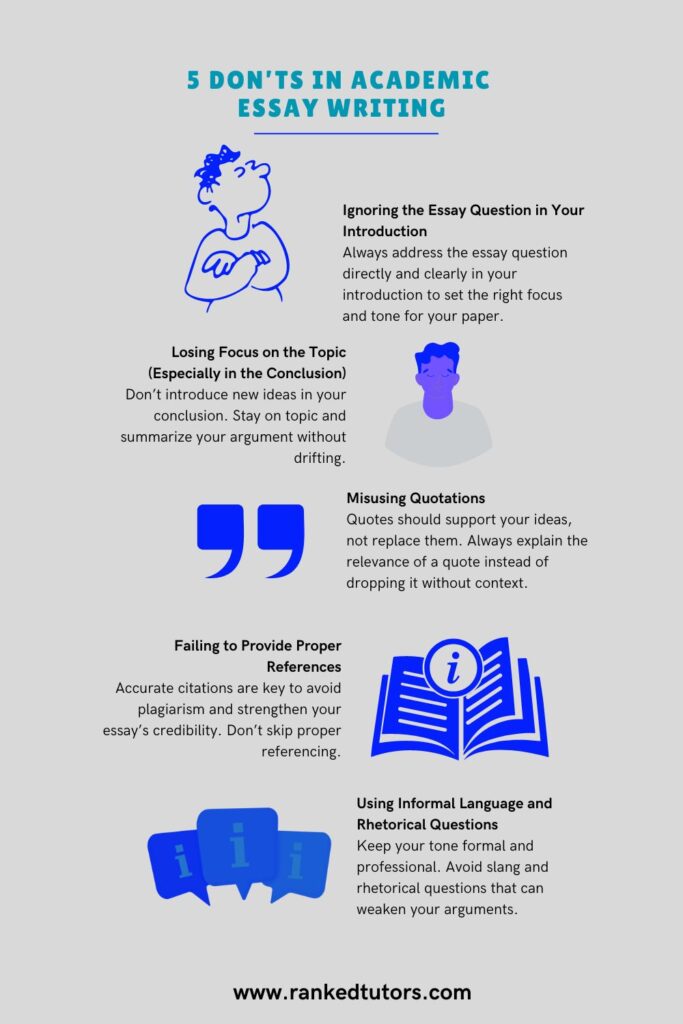Top 5 Essay Mistakes Students Must Avoid for Academic Success (With Infographic)

Ah, college life! It’s a mix of freedom, excitement, and, of course, that dreaded beast: academic essays. We’ve all been there, hunched over a blank screen at 3 AM, wondering why writing a simple essay feels like scaling Mount Everest. But fear not—the struggle can be less painful if you avoid the common pitfalls. To excel in essay writing, it’s not just about knowing what to do, but also understanding what to avoid.
This guide will uncover the top five essay mistakes that college students frequently make and provide actionable strategies to help you avoid them, setting you up for academic success.
1. Ignoring the Essay Question in Your Introduction
Your introduction sets the tone for your entire essay and provides a roadmap for your readers. One of the most common essay mistakes to avoid is failing to address the essay question directly in the introduction. When you don’t clearly state the topic and your position, it can confuse the reader and weaken your argument.
Why It’s a Mistake
An unclear introduction can lead the reader to misunderstand the focus of your essay, causing misinterpretation. It dilutes the impact of your argument and makes it harder for the reader to grasp your central thesis.
How to Avoid It
- Directly address the essay question in the first few sentences.
- State your thesis clearly to show the reader your stance.
- Avoid broad or irrelevant statements, such as sweeping generalizations or quotes that don’t directly tie to the topic.
Example
- Weak Introduction
“Throughout history, myths have played an important role in cultures around the world.” - Strong Introduction
“This essay examines the thematic links between the myths of Prometheus, Pandora, and Sisyphus, arguing that each illustrates the consequences of defying divine authority.”
2. Losing Focus on the Topic (Especially in the Conclusion)
A strong essay requires consistent focus on the central topic, especially in the conclusion. It’s easy to veer off-topic when summarizing but doing so can confuse your reader and weaken your essay’s overall impact.
Why It’s a Mistake
The conclusion is meant to reinforce your key points and thesis. Introducing new ideas or straying from the main argument can make your essay feel unfocused and leave the reader questioning your argument’s validity.
How to Avoid It
- Reiterate your thesis and main points in the conclusion without introducing new information.
- Ensure each sentence in your conclusion contributes to summarizing your argument.
- Avoid broad statements that do not directly relate to the essay question.
Example
- Off-Topic Conclusion
“In modern society, we can see how myths continue to influence cinema and literature.” - Focused Conclusion
“In conclusion, the myths of Prometheus, Pandora, and Sisyphus collectively demonstrate the peril of challenging the gods, reinforcing the theme of divine retribution.”

3. Misusing Quotations
Properly incorporating quotations can strengthen your argument, but many students fall into the trap of using them incorrectly. Dropping quotes without context or explanation disrupts the essay’s flow and leaves the reader puzzled.
Why It’s a Mistake
Quotations should support your ideas, not replace them. When used without proper introduction or analysis, quotes can confuse the reader and undermine your argument.
How to Avoid It
- Introduce quotations by providing context that explains why the quote is relevant.
- Explain the significance of the quote and how it supports your argument.
- Use quotes sparingly and ensure they add value to your discussion.
Example
- Misused Quote
“Gladiator shows were hardly the bloodbaths we see in modern films and TV programs. If there were five fights in a day, on average only one would end in death.” - Improved Use of Quote
“Johnstone challenges the perception of gladiatorial games as brutal spectacles, stating, ‘Gladiator shows were hardly the bloodbaths we see in modern films and TV programs. If there were five fights in a day, on average only one would end in death,’ which suggests that survival rates were higher than commonly believed.”
4. Failing to Provide Proper References
Citing sources is crucial for lending credibility to your essay and avoiding plagiarism. However, many students neglect proper referencing, which can weaken their arguments and lead to academic repercussions.
Why It’s a Mistake
References give credit to original authors and allow readers to verify the information. Without them, your arguments appear unsubstantiated, and you risk accusations of plagiarism.
How to Avoid It
- Cite primary sources when referencing specific events or passages.
- Use secondary sources when discussing ideas or data from other authors.
- Follow the appropriate citation style (e.g., APA, MLA, Chicago) as required by your academic institution.
Example
- Incorrect Reference
“Hector criticizes Paris before the duel.” - Correct Reference
“In Homer’s Iliad, Hector calls Paris ‘the bane of Troy’ before his duel with Menelaus (Iliad 3.39).”
5. Using Informal Language and Rhetorical Questions
Academic essays require a formal tone. Using informal language or rhetorical questions can make your essay seem unprofessional and distract the reader from your arguments.
Why It’s a Mistake
Informal language undermines the essay’s seriousness. Rhetorical questions can divert the reader’s attention and place the responsibility of interpretation onto them, weakening your argument.
How to Avoid It
- Use formal language and avoid slang or colloquialisms.
- Rephrase rhetorical questions into definitive statements that strengthen your argument.
- Avoid contractions like “don’t” or “can’t.” Use “do not” or “cannot” instead.
Example
- Informal Language
“Why did Zeus decide to punish man for Prometheus’s actions? You’d think he would have targeted Prometheus directly.” - Formal Language
“Zeus chose to punish humanity for Prometheus’s transgressions, demonstrating the gods’ indirect approach to retribution.”
Summing It Up
Avoiding these common essay mistakes can significantly enhance the quality of your writing and help you achieve better academic results. By directly addressing the essay question, maintaining focus, properly integrating quotations, providing accurate references, and using formal language, you’ll produce essays that are clear, compelling, and academically sound.
Remember, clarity and precision are key in academic writing. By steering clear of these pitfalls, you’ll ensure your essays stand out for the right reasons.

FAQs
1. Can I use first-person pronouns in my essay?
Generally, it’s best to avoid first-person pronouns like “I” or “we” in academic essays unless specifically instructed otherwise. Maintain a formal tone by focusing on the subject matter rather than personal opinions.
2. Is it acceptable to start an essay with a quote?
Starting with a quote can be risky. If the quote isn’t directly related to your thesis, it can confuse the reader. It’s usually more effective to begin by directly addressing the essay question.
3. How many references should I include in my essay?
The number of references depends on the essay length and the assignment guidelines. Make sure every claim is supported by credible sources, but avoid overwhelming the reader with unnecessary citations.
4. What is the best way to stay on topic throughout my essay?
Create an outline before you start writing and refer back to the essay question regularly. This helps ensure each paragraph contributes to your argument.
5. Can I use contractions in my essay?
It’s best to avoid contractions in formal writing. Use full forms like “do not” instead of “don’t” to maintain a professional tone.
Ready to take your essay writing to the next level? Apply these tips to your next assignment and see the difference. If you found this guide helpful, share it with your classmates and help them avoid these common pitfalls.